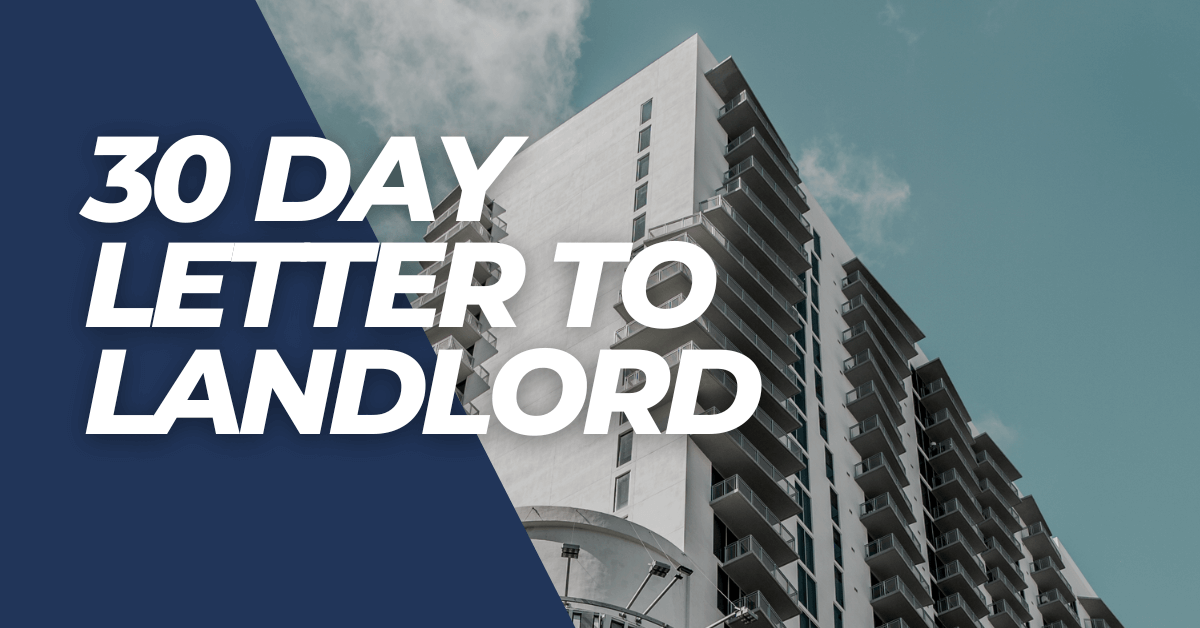A 30-day letter to a landlord is a written notice from a tenant to inform their landlord about their intention to vacate the rental property. Its purpose is to comply with the terms of the lease agreement, which often requires tenants to give a certain amount of notice before moving out.
In this article, we will provide you with templates and examples of 30-day letters to landlords. These samples will help you craft your own letter with ease, whether you are ending a month-to-month lease or simply giving notice within the required timeframe. By providing these resources, we aim to simplify the process of notifying your landlord about your plans to move out.
Our templates and examples cover various scenarios and can be customized to suit your specific needs. Whether you are moving to a new city, buying a home, or simply seeking a change of scenery, our samples will help you communicate your intentions clearly and professionally to your landlord.

Sample of a 30 Day Letter to Landlord
Dear [Landlord’s Name],
I hope this letter finds you well. I am writing to inform you that I will be vacating the rental property located at [Your Address] on [Date], as per our lease agreement. This letter serves as my 30-day notice, as required by our rental agreement.
I have truly enjoyed living in your property and appreciate your prompt attention to any maintenance issues that arose during my tenancy. I will ensure that the property is left clean and in good condition before my departure.
Please let me know if you require any additional information or if there are any specific move-out procedures I need to follow. I can be reached at [Your Phone Number] or [Your Email Address] if you have any questions.
Thank you for understanding, and I wish you all the best in finding a new tenant for the property.
Sincerely,
[Your Name]
How to Write a 30 Day Letter to Landlord
Writing a 30-day letter to your landlord may seem daunting, but with the right approach, you can effectively communicate your intentions to vacate the rental property. Here are seven steps to help you draft a clear and professional letter:
1. Understand Your Lease Agreement:
Before writing your letter, review your lease agreement to understand the notice requirements for ending your tenancy. Most leases require a 30-day notice, but some may require longer.
2. Use a Proper Format:
Start your letter with your name and address, followed by the date and your landlord’s name and address. Use a formal greeting, such as “Dear [Landlord’s Name],”
3. Clearly State you’re Intentions:
Begin your letter by clearly stating that you intend to vacate the rental property. Include the date you plan to move out, which should be at least 30 days from the date of the letter.
4. Provide a Reason (If Applicable):
If you are vacating due to a specific reason, such as purchasing a home or relocating for work, briefly explain this in your letter. This can help your landlord understand your situation.
5. Offer to Discuss Further:
In your letter, offer to discuss the move-out process further if needed. Provide your contact information and let your landlord know the best way to reach you.
6. Thank Your Landlord:
Express gratitude to your landlord for the opportunity to live in the rental property. Acknowledge any positive experiences you had during your tenancy.
7. Close Professionally:
Close your letter with a professional sign-off, such as “Sincerely,” followed by your name. Print the letter and sign it before sending it to your landlord.
By following these steps, you can write a clear and effective 30-day letter to your landlord, ensuring a smooth transition out of the rental property.
Tips and Tricks
1. Check Your Lease Agreement:
Before drafting your 30-day letter to your landlord, review your lease agreement to ensure you are following the correct notice period and any specific requirements for written notice.
2. Be Clear and Concise:
Your letter should clearly state your intention to vacate the rental property and include the date of your planned move-out. Avoid using vague language or unnecessary details.
3. Provide Contact Information:
Include your current contact information in the letter so that your landlord can easily reach you if they have any questions or need to discuss your move-out.

4. Request a Walk-Through Inspection:
It’s a good idea to request a walk-through inspection with your landlord before moving out. This can help you identify any issues that need to be addressed before returning the keys.
5. Keep a Copy for Your Records:
Make sure to keep a copy of your 30-day letter for your records. This can serve as proof that you provided the required notice to your landlord.
6. Follow Up with a Phone Call:
After sending your letter, follow up with a phone call to ensure that your landlord received it and to discuss any further steps that need to be taken.
7. Leave the Property in Good Condition:
Before moving out, make sure to clean the rental property and repair any damage that occurred during your tenancy. This can help ensure a smooth transition and the return of your security deposit.
FAQs about a 30 Day Letter to Landlord
When writing a 30-day letter to your landlord, you may have some common questions. Here are the answers to five frequently asked questions about this topic:
1. What is a 30-day letter to a landlord?
A 30-day letter to a landlord is a written notice from a tenant to inform the landlord about their intention to vacate the rental property within 30 days. It is often required by lease agreements to give the landlord sufficient notice before moving out.
2. When should I send a 30-day letter to my landlord?
It is recommended to send your 30-day letter to your landlord at least 30 days before your intended move-out date. This allows the landlord enough time to make arrangements for finding a new tenant.
3. What should I include in a 30-day letter to my landlord?
In your 30-day letter, include your intention to move out, the date of your intended move-out, and your contact information. You may also include any requests for a walk-through inspection or instructions for returning keys.
4. Do I need to send a 30-day letter if my lease is ending?
If your lease is ending and you do not intend to renew it, you may still be required to send a 30-day letter to inform your landlord of your intention to move out. Check your lease agreement for specific requirements.
5. Can I send my 30-day letter via email?
It is recommended to send your 30-day letter to your landlord via certified mail with a return receipt requested or deliver it in person. This ensures that you have proof of delivery and that the landlord receives the notice in a timely manner.
RELATED:
Letter of Complaint to Landlord about Maintenance
Landlord Letter to Tenant Proof of Residence
Noise Complaint Letter to Landlord
